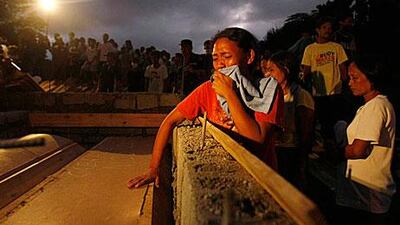ILIGAN, PHILIPPINES // The Philippine government shipped more than 400 coffins yesterday to two flood-stricken cities in the south where the death toll neared 1,000.
The move came as the president, Benigno Aquino, declared a state of national calamity and relief agencies rushed to help.
The latest figures show 957 have died and 49 are missing but the toll is set to climb further, with bodies being recovered from the sea and mud in the cities of Iligan and Cagayan de Oro.
A handful of morgues were overwhelmed and running out of coffins and formaldehyde for embalming.
Aid workers appealed for bottled water, blankets, tents and clothes for many of the 45,000 people displaced in crowded evacuation centres.
Navy sailors in Manila loaded a ship with 437 white, wooden coffins to help local authorities handle the staggering number of dead.
Also on the way were containers with thousands of water bottles.
Most of the dead were women and children who drowned on Friday night when flash floods triggered by a tropical storm gushed into homes while people were asleep.
A Briton was the first foreigner to die in the flooding, according to the British Embassy in Manila. It did not provide further details.
Mr Aquino, on a visit to Cagayan de Oro yesterday, said the national calamity declaration would help local authorities to gain quick access to recovery funds and keep the prices of basic goods stable.
"Our national government will do its best to prevent a repeat of this tragedy," Mr Aquino told residents who came out to greet him.
He added that there would be an assessment of what went wrong and why so many people died, if there was ample warning that a storm would sweep through the area and why people living along riverbanks and close to the coast had not been moved to safety.

